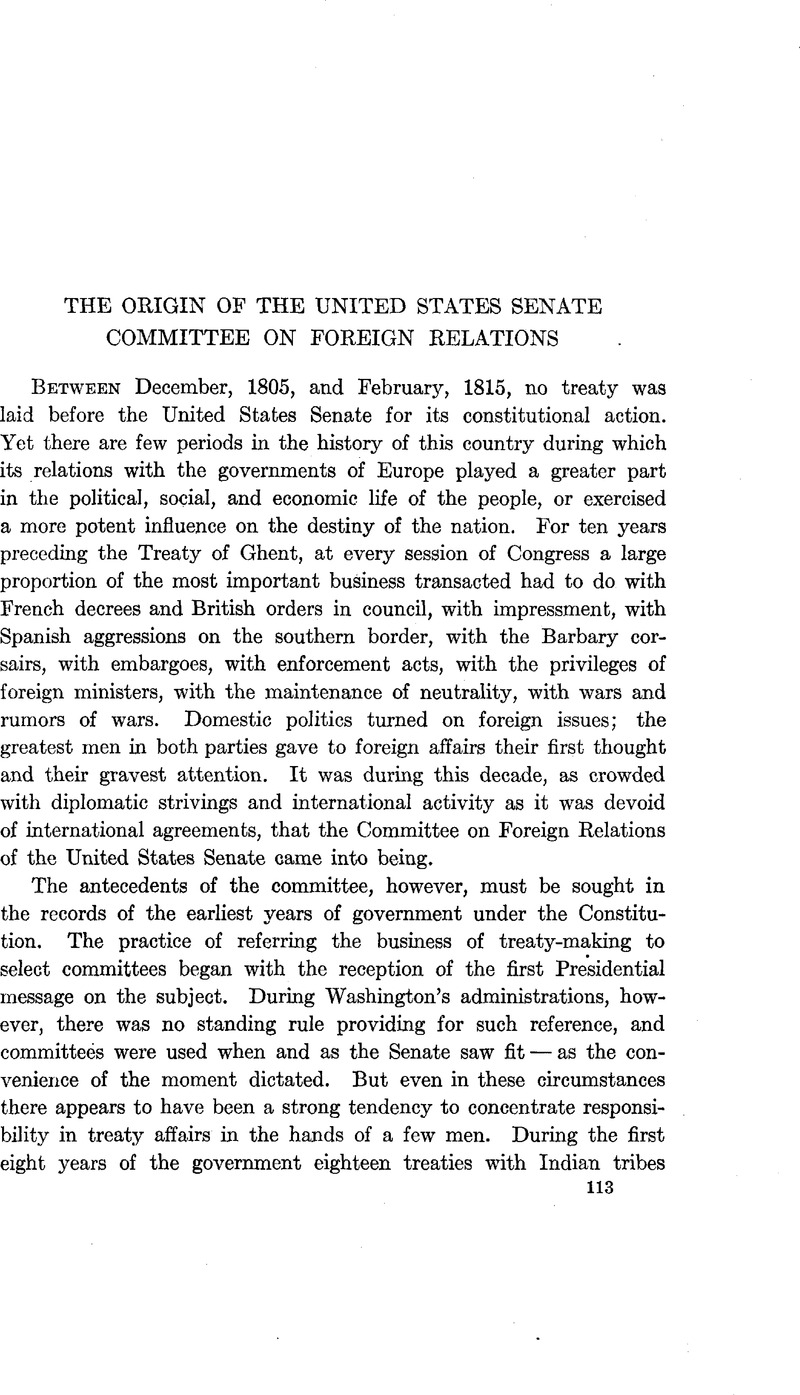No CrossRef data available.
Article contents
The Origin of the United States Senate Committee on Foreign Relations
Published online by Cambridge University Press: 04 May 2017
Abstract

- Type
- Research Article
- Information
- Copyright
- Copyright © American Society of International Law 1917
References
1 This includes additional articles upon which the Senate took separate action.
2 It should be noted that during the whole of the period under consideration Senate committees were chosen by ballot, a plurality of votes electing. In December, 1805, John Quincy Adams observed, in his diary: “As our committees are all chosen by ballot the influence and weight of a member can very well be measured by the number and importance of those of which he is a member.” He added, “In this respect I have no excitements of vanity.” Diary of John Quincy Adams, Memoirs, I, 329.
3 Annals of Congress, 1789-1791, II, 1730.
4 Ibid., p. 1735
5 Ibid., pp. 1740-1741; 1743-1744, 1749, 1753, 1763, 1774-1776; Compilation of Reports, Senate Committee on Foreign Relations, IV, 5-6; Senate Executive Journal, I, 72, 78.
6 Annals of Congress, 1791-1793, pp. 24-25.
7 Ibid., pp. 26, 29, 41; Compilation of Reports, Sen. Com. For. Rels., VIII, 6; Senate Executive Journal, I, 91.
8 Annals of Congress, 1793-1795, pp. 14-15, 19, 31, 32, 37, 38, 55, 56, 62, 80; Am. State Papers, For. Rel., I, 141-243, 277-288, 309-311, 312-314, 315-323.
9 Richardson, Messages, I, 233-239.
10 Ibid., pp. 250-254.
11 Annals of Congress, 1797-1799, I, 475.
12 Annals of Congress, 1797-1799, I, 497-498, 505-506, 523-525, 529, 540, 542-543, 548, 571-573, 585-586, 590-591, 597, 604, 609; Am. State Papers, For. Rel., II, 116-119, 152.
13 Annals of Congress, 1797-1799, I, 516, 517, 555, 571, 581, 585-586; Am. State Papers, For. Rel., II, 150-151, 153-163, 169-182, 185-188, 188-199, 199-201.
14 Annals of Congress, 1807-1808, pp. 19, 34, 50-53, 63-64, 78, 79, 104, 127, 151, 153, 173-174, 178, 186, 361-371, 378.
15 Annals of Congress, 1807-1808, p. 19.
16 Richardson, Messages, I, 473-477.
17 Annals of Congress, 1807-1808, p. 478.
18 Ibid., pp. 478-479.
19 Annals of Congress, 1808-1809, pp. 481-482; see also Moore, International Law Digest, IV, 511-513.
20 Annals of Congress, 1808-1809, pp. 520, 526, 530-531, 550, 587.
21 Annals of Congress, 1810-1811, p. 16.
22 Ibid., pp. 21, 250.
23 Ibid., p. 10.
24 See Richard Hildreth, History of the United States, III, xxiii; Henry Adams, History of the United States, V, xv; F. E. Chadwick, Relations of the United States and Spain, Diplomacy, Ch. VI. It was in connection with this matter that Pickering was censured by the Senate for reading confidential papers in open session.
25 Senate Executive Journal, II, 176, 182.
26 Annals of Congress, 1811-1812, pp. 15-17.
27 Ibid., 1812-1813, pp. 13-14.
28 Ibid., p. 17. The other subjects were: The naval establishment of the United States; American vessels which had arrived in the United States laden with British manufactures; the revision of the militia laws.
29 Annals of Congress, 1812-1813, p. 19.
30 Ibid., 1812-1813, pp. 18-19, 21, 27, 39, 94,101,104,105,112,113,115, 117,121.
31 Ibid., 1813-1814, pp. 18-19.
32 Ibid., pp. 25, 31, 36-39, 45, 47, 55, 59.
33 Senate Executive Journal, II, 347.
34 Senate Executive Journal, II, 347, 352, 354, 395. Adams’ History of the United States, VII, 59-64, presents a most interesting discussion of this struggle, its outcome, and its political significance.
35 Annals of Congress, 1813-1814, pp. 459, 550, 551, 562, 565, 570, 601, 613, 629, 630, 63G, 639, 676, 706-727, 735, 738-739, 741, 764, 773; Am. State Papers, For. Rel., Ill, 621-623, 964.
36 Richardson, Messages, I, 547-551. The only parts of the message which were referred to select committees at this time were those concerning the militia, and military affairs. Annals of Congress, 1814-1815, III, 16.
37 Annals of Congress, 1814-1815, III, 24, 27.
38 Ibid., pp. 24, 27, 164, 245-250, 260, 269, 270, 275, 278, 280, 294-297.
39 Bibb, the chairman of this committee, and Taylor, Chase, and Brown had served on the Foreign Relations Committee of the preceding session. Also the committee had dropped back to five members, the size* which it had had until the year before, when it had gone to seven. Rufus King was the only member of the new committee who had not served on its immediate predecessor, � and no man then in the Senate was possessed of more experience in the field of foreign relations than had King.
40 Am. State Papers, For. Rel., Ill, 693-695.
41 Annals of Congress, 1814-1815, III, 294-296.
42 Senate Executive Journal, III, 621.
43 Annals of Congress, 1815-1816, pp. 19, 20. Committees were chosen to consider those parts of the message concerning foreign affairs, the militia, military affairs, naval affairs, finance and a uniform national currency, manufactures, roads and canals, and a national seminary of learning within the District of Columbia.
44 Annals of Congress, 1816-1817, pp. 18-22, 30, 32. The other committees named were those on finance, commerce and manufactures, military affairs, the militia, naval affairs, public lands, claims, the judiciary, the post office and post roads, and pensions. All of the members of this first Standing Committee on Foreign Relations were leaders in the Senate and in the nation. Barbour was a member continuously from 1816 until 1824, the last session before he left the Senate to become Secretary of War. He was chairman in 1816, 1817, 1820, 1822, 1823, and 1824. Nathaniel Mason was a member of the committee for twelve years, and was thrice chairman. Except for one session, Rufus King served from 1815 to 1823. S. W. Dana served only during the session of 1816, while Abner Lacock was a member for three years. King and Dana were the Federalist members.




